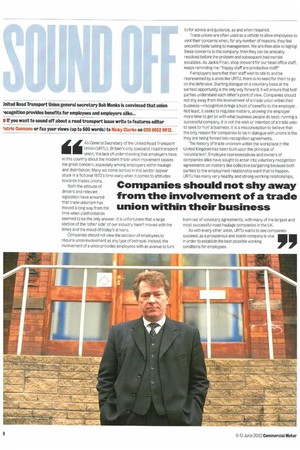6 As s ni General on ( usr u S ) e c B r r e i t t a a
Page 48

If you've noticed an error in this article please click here to report it so we can fix it.
irryi, so fotnhl ye sUpnei tcei adl i Rs to raodaTdrtarnasnpsopl t union, the lack of understanding that employers have in this country about the modern trade union movement causes me great concern, especially among employers within haulage and distribution. Many we come across in this sector appear stuck in a fictional 1970's time warp when it comes to attitudes towards trades unions.
Both the attitude of drivers and relevant legislation have ensured that trade unionism has moved a long way from the time when confrontation seemed to be the only answer. It is unfortunate that a large section of the 'other side' of our industry hasn't moved with the times and the mood of today's drivers.
Companies should not view the decision of employees to require union involvement as any type of betrayal. Instead, the involvement of a union provides employees with an avenue to turn to for advice and guidance, as and when required.
Trade unions are often used as a vehicle to allow employees to vent their concerns when, for any number of reasons, they feel uncomfortable talking to management. We are then able to highligt these concerns to the company; then they can be amicably resolved before the problem and subsequent bad morale escalates. As Jackie Finan, shop steward for our head office staff, keeps reminding me: "Happy staff are productive staff!"
If employers learn that their staff wish to talk to and be represented by a union like URTU, there is no need for them to go on the defensive. Starting dialogue on a voluntary basis at the earliest opportunity is the only way forward; it will ensure that bott parties understand each other's point of view. Companies should not shy away from the involvement of a trade union within their business—recognition brings a host of benefits to the employer. Not least, it seeks to regulate matters, allowing the employer more time to get on with what business people do best: running a successful company. It is not the wish or intention of a trade unioi to seek to 'run' a business. It is a misconception to believe that the only reason for companies to be in dialogue with unions is tha they are being forced into recognition agreements.
The history of trade unionism within the workplace in the United Kingdom has been built upon the principal of 'voluntarism'. Employee representatives and owners of companies alike have sought to enter into voluntary recognition agreements on matters like collective bargaining because both parties to the employment relationship want that to happen. URTU has many very healthy and strong working relationships, born out of voluntary agreements, with many of the largest and most successful road haulage companies in the UK.
As with every other union, URTU wants to see companies succeed, as a prosperous and stable company is vital in order to establish the best possible working conditions for employees.




















































































































































